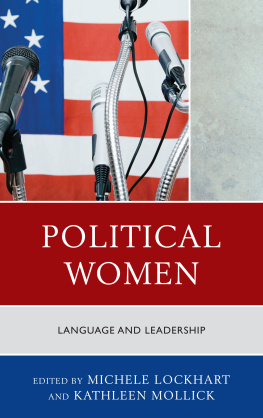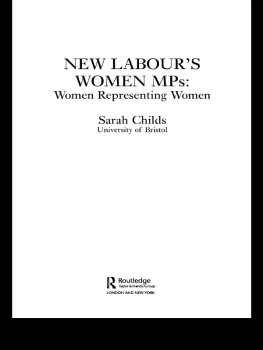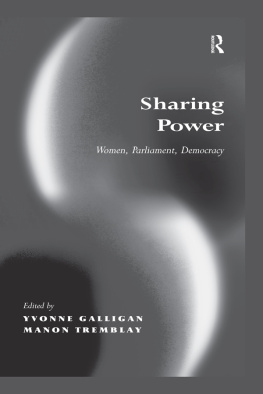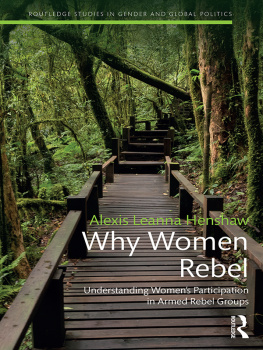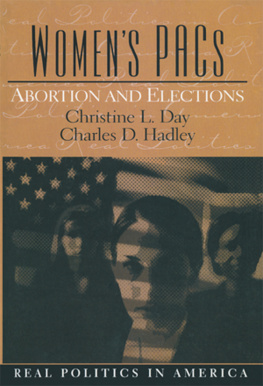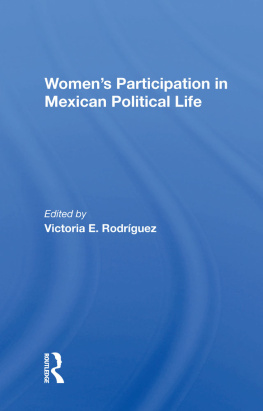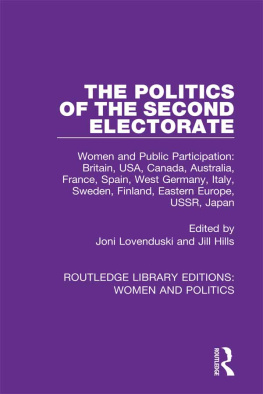THIRD EDITION
WOMEN, POLITICS, AND POWER
For our families, with love and gratitude
THIRD EDITION
WOMEN, POLITICS, AND POWER
A Global Perspective

PAMELA PAXTON
The University of Texas at Austin
MELANIE M. HUGHES
University of Pittsburgh


FOR INFORMATION:
CQ Press
An Imprint of SAGE Publications, Inc.
2455 Teller Road
Thousand Oaks, California 91320
E-mail:
SAGE Publications Ltd.
1 Olivers Yard
55 City Road
London EC1Y 1SP
United Kingdom
SAGE Publications India Pvt. Ltd.
B 1/I 1 Mohan Cooperative Industrial Area
Mathura Road, New Delhi 110 044
India
SAGE Publications Asia-Pacifc Pte. Ltd.
3 Church Street
#10-04 Samsung Hub
Singapore 049483
Acquisitions Editor: Michael Kerns
Editorial Assistant: Zachary Hoskins
Production Editor: Laura Barrett
Copy Editor: Megan Markanich
Typesetter: Hurix Systems Pvt Ltd.
Proofreader: Eleni Georgiou
Indexer: Mary Mortensen
Cover Designer: Janet Kiesel
Marketing Manager: Amy Whitaker
Copyright 2017 by CQ Press, an Imprint of SAGE Publications, Inc. CQ Press is a registered trademark of Congressional Quarterly Inc.
All rights reserved. No part of this book may be reproduced or utilized in any form or by any means, electronic or mechanical, including photocopying, recording, or by any information storage and retrieval system, without permission in writing from the publisher.
Printed in the United States of America
ISBN 978-1-4833-7699-8
This book is printed on acid-free paper.
16 17 18 19 20 10 9 8 7 6 5 4 3 2 1
Brief Contents
Detailed Contents
About the Authors
Pamela Paxton is professor of sociology and public affairs and the Christine and Stanley E. Adams, Jr. Centennial Professor in the Liberal Arts at The University of Texas at Austin. She received her undergraduate degree from the University of Michigan in economics and sociology and her PhD in sociology from the University of North Carolina at Chapel Hill. She has consulted for the U.S. Agency for International Development (USAID) and the National Academies. She is the author of numerous scholarly articles on women in politics, which focus on statistical models of womens parliamentary representation. Her research has appeared in a variety of journals, including American Sociological Review, American Journal of Sociology, Social Forces, Comparative Politics, International Studies Quarterly, and Legislative Studies Quarterly. She is also an author of Nonrecursive Models: Endogeneity, Reciprocal Relationships, and Feedback Loops (2011).
Melanie M. Hughes is associate professor of sociology at The University of Pittsburgh. Born in Milwaukee, Wisconsin, she graduated from the University of Texas at Austin in 2001 with a degree in sociology and government and earned her PhD from The Ohio State University in 2008. Her affiliations include the Department of Political Science; the Ford Institute for Human Security; Gender, Sexuality and Womens Studies; and Global Studies. She specializes in political representation of women from marginalized groups. Her research on women in politics has appeared in journals such as American Sociological Review, American Political Science Review, Social Forces, and Politics & Gender. Currently, she is consulting with the U.S. Agency for International Development and the United Nations Development Programme to increase the availability of data on women in political leadership and public administration. She is also writing a new book on the political dominance of men from majority racial, ethnic, and religious groups worldwide.
SAGE was founded in 1965 by Sara Miller McCune to support the dissemination of usable knowledge by publishing innovative and high-quality research and teaching content. Today, we publish over 900 journals, including those of more than 400 learned societies, more than 800 new books per year, and a growing range of library products including archives, data, case studies, reports, and video. SAGE remains majority-owned by our founder, and after Saras lifetime will become owned by a charitable trust that secures our continued independence.
Los Angeles | London | New Delhi | Singapore | Washington DC
Preface
I magine that your country has 100% women in its parliament or national legislature. How does this make you feel? Are you concerned that men are not being well represented or served by the government? Now add 5% men back into the legislature. Do you feel better about a 95%5% split? What about 10% men? Are you comfortable yet?
Most readers might feel uncomfortable with a parliament made up entirely of women. But the reversethe complete dominance of legislatures by menis actually a reality in some countries. And where men do not completely dominate, they still hold over 80% of parliamentary seats in a wide range of countries. This book documents and explains the forces that contribute to such gender inequality in politics. But the story of womens exclusion from politics is changing. Increasingly, women are holding political positions around the world, and in some countries, womens political power has increased dramatically in recent years. Thus, in addition to exploring barriers to womens political access, this book devotes attention to where and how women have been gaining ground.
We open the third edition of our book by outlining the theoretical and practical reasons to incorporate women in politics formally, descriptively, and substantively. In the early chapters of the book, we track the growth in womens political participation over time beginning with the fight for womens suffrage (). In order to describe different patterns of growth in womens representation over time, we introduce five basic historical paths to power: (1) Flat, (2) Increasing, (3) Big Jump, (4) Low Increasing, and (5) Plateau. One point we make in these early chapters is that the West did not necessarily lead the world historically in womens political power and is not currently in the forefront of womens representation.
In ). The central message of these four chapters is that if we are to understand how women can gain political power, we must simultaneously understand cultural beliefs about womens place, the social structural position of women, the political environment in which women operate, and key international pressures on states to change.
But do women make a difference? Do women in positions of power change anything? Have women changed the style of politics? attempts to answer these questions by assessing not only womens numbers but their impact on policy, agenda setting, and legislative style. We argue that understanding womens influence is critical but that we face a variety of challenges in attempting to demonstrate the impact of women. We highlight additional possible sites of influence such as womens movements, look beyond laws to stress the symbolic importance of womens presence, and point out that many questions about minority womens impact remain.
In the second half of the book, we more clearly acknowledge differences among women both within countries and across geographic regions. discusses the political participation and representation of women from marginalized groups. We discuss some of the multiple barriers faced by racial, ethnic, and religious minority women, but we also discuss some of the circumstances under which such women are politically successful. The chapter also includes sections on indigenous women and sexual minoritieslesbian, bisexual, and transgender women.
Next page

